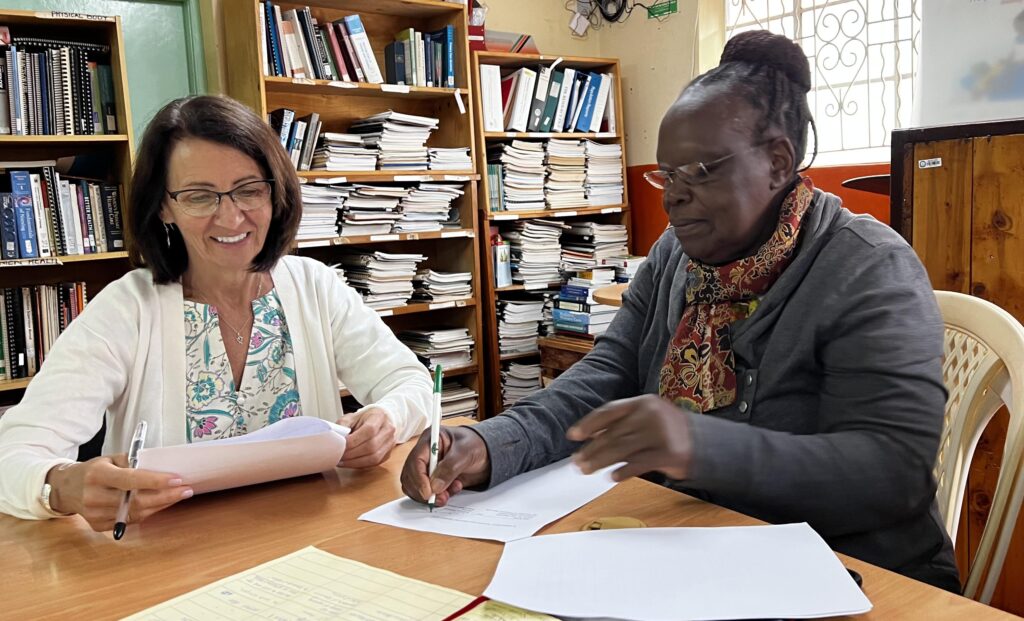We interviewed Melissa Hessock, clinical assistant professor for the College of Nursing, about their recent visit to Africa as part of the East African Exploratory delegation, led by Dean Niederhauser, dean of the College of Nursing. Hessock possesses clinical experience and expertise in maternal-newborn and reproductive healthcare.
Could you tell us how you got the opportunity to participate and why?
I was invited by Dean Niederhauser to join the College of Nursing representatives in the East Africa Exploratory delegation. These areas are key population health and outcome improvement focuses in the region. I was honored and thrilled to have the opportunity to travel to Rwanda and Kenya, meet healthcare and academic colleagues, and learn more about nursing and the delivery of healthcare in East Africa. I believe having a world view allow us to better conceptualize big pictures, be creative in developing solutions, engage as a global citizen, and meet individuals where they are – which is particularly important in providing individualized and equitable healthcare.
What were some of the activities or programs you engaged in during your time in Africa?
We had the opportunity to meet with several nursing programs, professional nursing organizations, government organizations such as the Ministry of Health and the U.S. Embassy in Rwanda, The African Population, and the Health Research Center, and non-profit organizations engaged in healthcare. Additionally, we were able to learn more about the history of Rwanda by visiting the Kigali Genocide Museum which was very impactful. Rwanda is a beautiful country of genuine, kind, and welcoming people. We have much we could learn from them about how to come together as a community after terrible division and tragedy. During non-work times, we had the opportunity to explore the area, food, culture, and go on a short Safari at the nearby Nairobi National Park.
“We aspire to engage in new partnerships for shared solutions in agriculture and public health that improves Life and Lives within local and global communities.” – Melissa Hessock
We also interviewed Lars Dzikus, associate professor and executive director of academic affairs in sport studies, who was also invited to be a part of the delegation. He is also involved with the Center for Sport, Peace, and Society which has several contacts in East Africa through its Global Sports Mentoring Program.
What do you hope the long-term impacts of this trip will be, both for UT folks and the groups you interacted with in Africa?
Many of the colleagues we met in East Africa knew little about Tennessee, let alone our university. Several other American universities have long-standing partnerships in the region, for example, Michigan State University. Given the many joint challenges we face (e.g., lack of physical activity, support of women’s sports, and development of sustainable infrastructures for sport) and the growing potential for collaborations, it is time for UT to strengthen its global presence, especially in Africa. In the future, UT students will have more exciting study-abroad prospects, and the students from Africa will benefit from the tremendous opportunities that Tennessee offers. We will also see more interdisciplinary research projects with our international partners. One specific topic I discussed with colleagues in Rwanda is the prevention of sexual violence in sport.
In the United States, scandals of sexual violence in sport have garnered much public attention (e.g., Jerry Sandusky at Pennsylvania State, Larry Nassar at Michigan State and in the U.S. Gymnastics, and Richard Strauss at Ohio State). However, these cases represent only the most visible tip of an iceberg that stretches across all levels of sport.
In Rwanda, during the 1994 genocide, “women were subjected to sexual violence on a massive scale”. (Human Rights Watch, 1996). My colleagues in Rwanda shared their concerns that these experiences continue to have ripple effects that also play out in sports. This is one example of potential international partnerships seeking shared solutions to improve lives within the local and global communities.
Do you have any advice for other faculty members considering participating in similar educational trips?
I can only encourage any colleague to participate. It has been an incredible learning experience. One unexpected outcome was bonding with my UT colleagues. I had never interacted with any of them, but midway through the trip, we had developed into a team. I can’t wait to see them again and keep our work going. The trip was incredible. I walked away from it more committed than ever to the university, the state, and its citizens. It was an honor to represent UT in these meetings and it was humbling to discover just how much we can learn from our partners in East Africa.
